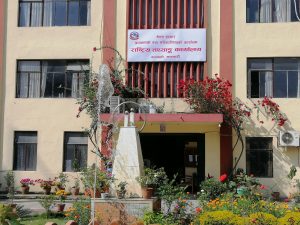Nepal’s Covid-19 crisis is getting worse. In the past two weeks, the situation is getting worse as the number of positive cases is on the rise every day. On May 2, a further 7,137 positive cases were reported in the country as the number of active cases has reached close to 50,000.
One of the most hit areas by the virus is the Kathmandu valley as it has almost half of the active cases across the country. This has resulted in a lot of state-owned hospitals being full of Covid-19 patients who come from all over Nepal.
With hospitals in other districts also full and unprepared for the pandemic, people are coming to Kathmandu in the hope they get better care. Some have been airlifted to the valley while some have even paid as much as Rs 50,000 to get here.
But, the condition of the state-owned hospital in the valley is no different from that of other districts. Hardly any beds are vacant and patients worry that things can go bad as it is clear that these hospitals do not have the capacity to deal with the pandemic and what is to come.
One such example is Lalitpur’s Patan Hospital. Looking at the state of it, it is evident that the hospital officials, like others, are not prepared for the pandemic to hit the valley so hard.
Complaints galore
People waiting for their family to get better seemed clearly irked at the way the hospital is being run amidst the pandemic. Some are seen complaining about the cleanliness of the place while some are talking about the hospital not providing test reports on time. Many feel that the hospital could be doing a lot better to manage the problem at hand.
“How can it take them three days to give a report that is usually one day at other areas,” questions Rishi Shrestha, a resident of Kirtipur. “Adding to that, the place for people who wait for the ill is a complete mess.”

Shrestha brought his 52-year-old wife to the hospital after she tested positive for Covid-19 on April 18. He says that the doctors are yet to give him a clear answer about what exactly is wrong with his wife.
“It’s been two weeks since I brought her here, but things have not improved,” he says with a pile of reports in his hands. “I just want clarity that’s all. This suspense is not good for both of us.”
Like Shrestha, Rakesh KC from Balkot in Bhaktapur says that the Covid-19 ward at Patan Hospital could be managed a lot better. KC had to admit his 35-year-old relative suffering from kidney issues who tested positive for Covid-19.
“They take more than usual time to give us test reports,” he says. “What’s even worse is that they even take time to give things like medicines, clothes and medical equipment to our patients.”
There is not a person at the hospital who does not have a complain. Some have complaints about the beds while there are people who also find some faults in the food.
“My wife says that the food is very bad. We’ve complained it to the hospital, but nothing has been done,” says Shrestha.

Many like Shrestha feel that the hospital could do better, but they have not lodged a formal complaint as they fear that their loved one will not be treated well if they do so.
“This is everyone’s problem. But, the hospital doesn’t seem to do anything about it,” says Shrestha.
The hospital has been feeding the patients themselves as it has barred their relatives from entering the Covid-19 ward. If anyone has a message to give out, they can do so by asking for help from a nurse or the security guard. Apart from that, most patients have a phone with them through which they can contact their relatives.
For those who do not have a phone or cannot use one, the relatives are seen requesting the nurses to help them and convey the message given to the nurse by their relative on time.
There are 70 beds in the general ward of the hospital, which is full of Covid-19 patients. An additional 25 beds have been added to the hospital’s ICU as cases continue to rise; most of them are filling up quickly.
Negligence in risk reduction

The general ward and the ICU are located on the second floor of the hospital which is being used for Covid-19 patients. There is only one way in and out of the area which is monitored by a security guard who is not allowed to let anyone enter without permission.
When we reached the ward entrance, we saw reports of Covid-19 patients lying unattended. It was quite evident that the virus could spread quite easily through these papers that lay on the floor. In front of the ward were empty bottles of saline and sanitiser and empty blood packets. Even full blood packets that were to be sent inside the ward laid on the floor.
Relatives of non-Covid-19 patients who had to share the same space with relatives of Covid-19 patients seemed worried about contracting the virus.
Outside the window of the Covid-19 ward was a pile of rubbish that had been there for days, claimed people. Next to the rubbish were equipment used every day in the hospital. The equipment could be used by health workers at any time which shows how the hospital is neglecting basic health and hygiene.

When asked why the relatives of Covid-19 patients were treated like this, the Covid-19 focal person Dr Bimal Pandey said that they were blowing things up unnecessarily.
“We’ve time and again told the patients’ relatives that there is no need to stay at the hospital,” says Dr Pandey. “But they still stay. When they do that, they increase the risk of being contracted by the virus themselves.”
About the rubbish, he said that some waste had piled up due to timing and that they were cleaning the hospital on a regular basis.
“We’ve been doing our best with limited resource. People need to understand that,” he added.

























